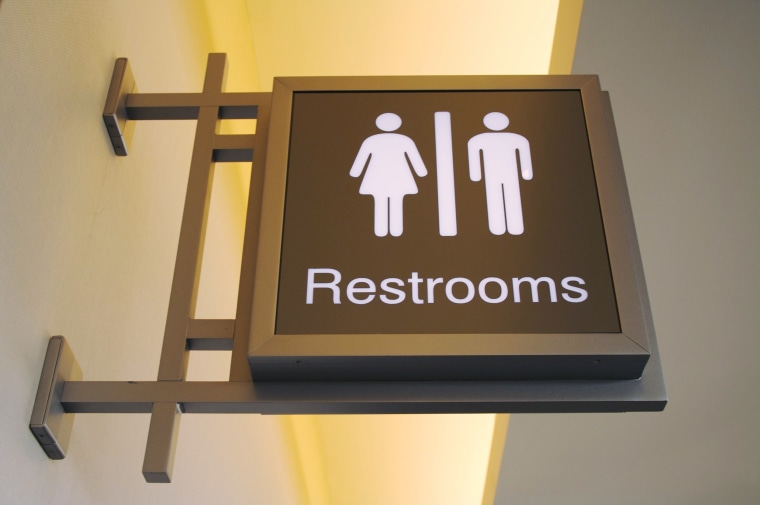The economic power of the LGBT rights movement is about to be put to the test in the standoff over a so-called "bathroom bill" in North Carolina.
LGBT advocates are renewing their calls for boycotts after North Carolina legislators adjourned late Friday without making substantial changes to the law, which requires transgender people to use public bathrooms and changing facilities based on the sex "which is stated on a person's birth certificate." The law, signed by Republican Gov. Pat McCrory in March, also bars localities from enacting ordinances to the contrary.
The Justice Department said the measure violates civil rights laws and is seeking a court order to block it.
"This is not over, and they will be called to account," said JoDee Winterhof, a senior vice president with the Washington-based Human Rights Campaign.
Business groups — including the NBA, which has a franchise in Charlotte and is planning to stage the 2017 All-Star Game there — are weighing their options. At least one legislator fears dire consequences.
"This is not just about the NBA All-Star game," said Democratic State Rep. Chris Sgro, who also serves as executive director of Equality NC, which has been pushing for repeal of the law. "This is about long-term economic sustainability for the state of North Carolina, and that is deeply at risk with the way our reputation has been damaged by this law."
Read More from CNBC: Stay Out of Private Sector-Bathroom Policies, North Carolina Governor Says
The Human Rights Campaign claims the law is already costing the state, citing figures from the Charlotte Chamber of Commerce that the Charlotte area alone has lost $285 million and 1,300 jobs.
But a sustained boycott would require businesses to turn aside a state that is traditionally one of America's most competitive just as its economy is returning to full strength following the recession. Proponents of the law, including the North Carolina Values Coalition, say that is what businesses should be focused on.
"Businesses who care about being bullied by the Human Rights Campaign more than they care about the citizens they serve or the profits their company makes are doing so to their own detriment," said Executive Director Tami Fitzgerald.
Evidence shows similar boycotts in the past have had limited impact.
Remember Indiana?
One year ago Indiana was the target of economic threats based on the state's controversial Religious Freedom Restoration Act, which allowed businesses to deny services if they conflict with a firmly held religious belief.
In the face of widespread protests that the law gave businesses a license to discriminate based on sexual orientation, Republican Gov. Mike Pence signed a new bill to clarify the law. But opponents said the change did not go far enough. At least one Indiana business, Angie's List, said it was putting an expansion in the state on hold as a result.
But one year later little has changed. The Indiana law is still in place, and Indianapolis' convention bureau, Visit Indy, reported record business last year despite market-share losses tied to the Religious Freedom law.
Salesforce.com announced plans in May to invest $40 million in Indianapolis and create 800 jobs as part of a move into the city's tallest building, Chase Tower, which is being renamed for the tech company. Salesforce founder and CEO Marc Benioff had been among the first and most vocal CEOs to challenge Indiana's RFRA law. Gov. Pence appeared with Salesforce Marketing Cloud CEO Scott McCorkle at the announcement of the deal.
"This investment is also possible because of the RFRA fix a year ago and because of the longstanding human rights ordinance in Indianapolis," McCorkle said of the deal. He stressed that the company's decision to expand in Indiana was not an endorsement of state policies and Salesforce would continue to push for LGBT rights in Indiana.
Read More from CNBC: NYC Mayor Signs Gender-Neutral Bathroom Bill Into Law
Angie's List said it has not changed its position. "We are open to all and discriminate against none," said spokeswoman Cheryl Reed.
But the company has not completely closed the door on expanding in Indiana.
"We are focused at the moment on our profitable growth plan and have yet to return to the topic of campus expansion," Reed said.
We put the question to the CNBC Global CFO Council, an elite group of chief financial officers representing public and private companies from various sectors. Of the dozen members responding, half expressed concerns that such laws might deter customers or qualified workers, and more than 40 percent said their companies had expressed these concerns to elected officials. But fewer than 17 percent said their companies had actually made location decisions based on the laws.
In North Carolina, opponents of H.B. 2 say some 200 businesses have signed on to a letter first made public in March urging Gov. McCrory and the legislature to repeal the law.
"Put simply, H.B. 2 is not a bill that reflects the values of our companies, of our country, or even the majority of North Carolinians," says the letter, which is signed by chief executives of companies, including Williams-Sonoma, Goldman Sachs and Xerox.
But the letter says nothing about what the companies might do if the law remains in effect.
And proponents of H.B. 2 say they have their own letter, with signatures representing 400 businesses that support the law.

